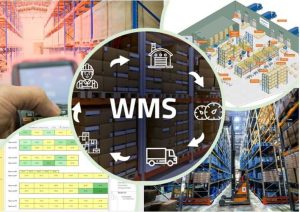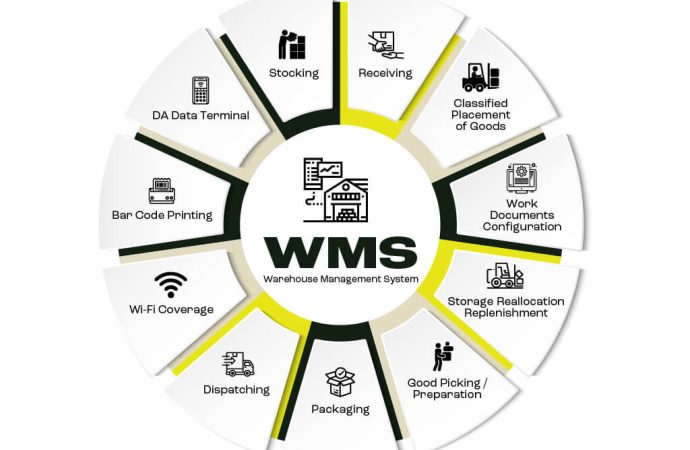Introduction A warehouse management system (WMS) is a software solution that helps businesses manage and control their day-to-day warehouse operations, from the moment goods and materials enter a warehouse until they leave. A good WMS is essential for any business that stores or distributes physical goods. It helps to streamline operations, improve inventory accuracy, and enhance overall
Introduction
A warehouse management system (WMS) is a software solution that helps businesses manage and control their day-to-day warehouse operations, from the moment goods and materials enter a warehouse until they leave. A good WMS is essential for any business that stores or distributes physical goods. It helps to streamline operations, improve inventory accuracy, and enhance overall efficiency.
What is a Warehouse Management System (WMS)?
A WMS is more than just a tool for tracking inventory. It’s a comprehensive system that provides a central hub for all warehouse activities. It helps businesses manage receiving, putaway, picking, packing, and shipping. A WMS also provides real-time visibility into inventory levels, order status, and employee performance. This allows businesses to make data-driven decisions and optimize their operations.
Why is a WMS Important?
A WMS is crucial for businesses for several reasons:
- Improved Efficiency: A WMS automates many manual tasks, such as data entry and inventory counting. This frees up employees to focus on more value-added activities.
- Increased Accuracy: A WMS helps to ensure that inventory data is accurate and up-to-date. This reduces errors, prevents stockouts, and improves customer satisfaction.
- Enhanced Visibility: A WMS provides real-time visibility into all warehouse operations. This allows businesses to track inventory, monitor employee performance, and identify areas for improvement.
- Reduced Costs: A WMS helps businesses reduce costs by optimizing space utilization, minimizing labor costs, and improving inventory accuracy.
Warehouse Management System Examples

Image by: Yandex.com
There are many different types of WMS solutions available, ranging from simple, cloud-based systems to complex, on-premise solutions. Here are a few examples of popular WMS providers:
1. SAP Extended Warehouse Management (EWM)
SAP EWM is a comprehensive WMS solution designed for large enterprises. It offers a wide range of features, including advanced warehouse automation, labor management, and yard management. SAP EWM is highly scalable and can be customized to meet the specific needs of any business. It integrates seamlessly with other SAP modules, such as SAP ERP, to provide a complete view of the supply chain.
2. Oracle Warehouse Management Cloud (WMS Cloud)
Oracle WMS Cloud is a modern, cloud-based WMS solution that is designed for businesses of all sizes. It offers a user-friendly interface and a wide range of features, including mobile-enabled picking, advanced planning, and reporting. Oracle WMS Cloud is highly scalable and can be deployed quickly and easily. Its cloud-based nature means that businesses don’t have to worry about maintaining hardware or software.
3. Manhattan Associates Warehouse Management
Manhattan Associates is a leading provider of supply chain solutions, and its WMS is one of the most popular in the industry. It offers a wide range of features, including labor management, slotting optimization, and yard management. Manhattan WMS is a highly scalable and flexible solution that can be deployed on-premise or in the cloud. It is a great choice for businesses that need a robust and feature-rich WMS.
4. Blue Yonder Warehouse Management
Blue Yonder (formerly JDA Software) is a global leader in supply chain management. Its WMS is a powerful solution that helps businesses optimize their warehouse operations. It offers a wide range of features, including labor management, task management, and slotting optimization. Blue Yonder WMS is a highly scalable and flexible solution that can be deployed on-premise or in the cloud.
5. Fishbowl Inventory
Fishbowl Inventory is a popular WMS solution for small and medium-sized businesses. It offers a wide range of features, including inventory management, order management, and manufacturing. Fishbowl is easy to use and integrates seamlessly with QuickBooks. It is a great choice for businesses that need a simple and affordable WMS.
How to Choose the Right WMS
Choosing the right WMS for your business can be a daunting task. Here are a few factors to consider:
- Business Size: The size of your business is a key factor to consider when choosing a WMS. If you are a small business, a simple, cloud-based solution like Fishbowl may be all you need. If you are a large enterprise, a more robust solution like SAP EWM or Manhattan Associates may be a better choice.
- Industry: The industry you are in can also play a role in your choice of WMS. For example, if you are in the food and beverage industry, you may need a WMS with features for lot tracking and expiration date management.
- Features: Consider the features you need in a WMS. Do you need labor management? Do you need yard management? Do you need advanced reporting? Make a list of the features that are most important to you and then compare different WMS solutions to see which ones offer the features you need.
- Budget: Your budget is another important factor to consider. WMS solutions can range in price from a few hundred dollars to hundreds of thousands of dollars. Be sure to choose a solution that fits your budget.
- Integration: Consider how the WMS will integrate with your existing systems, such as your ERP or e-commerce A WMS that integrates seamlessly with your existing systems will save you time and money.
Conclusion
A WMS is a critical tool for any business that stores or distributes physical goods. It helps to streamline operations, improve inventory accuracy, and enhance overall efficiency. There are many different types of WMS solutions available, so it is important to do your research and choose the right one for your business. By considering your business size, industry, features, budget, and integration needs, you can find a WMS that will help you take your business to the next level.
















